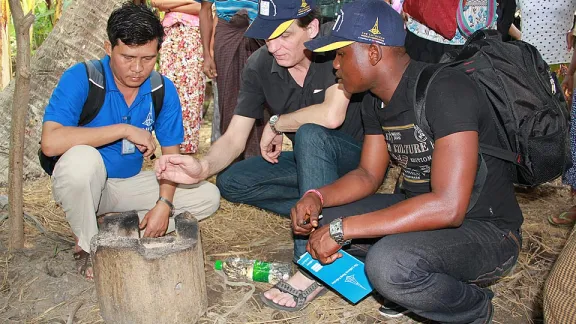
Members of the LWF Committee for World Service and a local staff person observe a fuel-efficient stove made from local materials at Ah Si Ka Lay village, southern Myanmar. © LWF Myanmar/Wyne Sandy Myint
Committee for World Service Visits Projects, Approves Global Strategy
(LWI) – The bi-annual meeting of the Committee for World Service held in Yangon, Myanmar, 14-17 January, was an occasion for members of The Lutheran World Federation (LWF) governance body to learn how the LWF works with local communities to promote sustainable livelihoods.
Committee members travelled 93 kilometers by boat through canals and rivers to four villages in the Ayeyarwaddy delta in the south, where the LWF Department for World Service (DWS) supports community members in building capacity to meet basic needs.
At That Htay Gone village, a 45 year old mother shared her experience of being a partner household of LWF Myanmar. “Before I did not have a proper latrine and did not know how important hygiene was. My children and I frequently suffered from diarrhea and other diseases related to poor hygiene.”
In 2011 an LWF-trained village health volunteer explained the importance of proper sanitation and how to build and use a latrine properly, she said. “We built a fly-proof latrine, supported by LWF Myanmar. Since then, our health is better. That means we can work more and earn more. LWF helped me plan for a better future. Now I have chickens and a piglet. I am aware of these changes in my family because I record them on the partner household assessment form.”
The chairpersons of the respective village development committees—including youth, women, farmers’ and manual laborers’ groups—explained how the members actively participate in different activities.
Sharing his impressions after the visits, Mr Peter Schirmer, executive secretary, Australian Lutheran World Service said, “The community seems to be confident. They actively participated in the process of construction of a community hall and bridges by taking and sharing responsibility among the villagers in an organized manner. This was an uplifting sign of the unity within the community.”
Other committee members commended the positive community participation and the significant improvement of the village in just three years through the empowerment process.
Mr Rudelmar Bueno de Faria, DWS global program coordinator expressed appreciation to LWF Myanmar for the inclusion of school-age children in the village projects. “In the children’s club, the youth group members facilitate children to get involved in village development activities such as plastic management and waste control campaign. I believe that this process encourages children’s participation, and teaches them to take responsibility in development activities to improve their lives in the village. In the future, these children will gradually be empowered to take over village development management.”
In a country that is prone to flooding, the World Service program works in 50 villages in four districts. LWF’s intervention began in 2008, following the cyclone Nargis, which killed nearly 140,000 people and destroyed housing, infrastructure and livelihoods. The current focus includes support to communities in initiatives for disaster reduction and management through trained teams, awareness-raising, and prevention and mitigation interventions.
In his official address to the committee, DWS director Rev. Eberhard Hitzler noted that the likelihood of more countries and people being adversely affected by cyclones and other natural disasters remains an additional challenge for World Service’s work in the coming years. He said the global environment and events which affect LWF’s humanitarian response include the negative impact of climate change; increased violent conflicts; the global financial crisis; and the need to pay more attention to the role of religion in humanitarian and development work.
In addition to input from the Myanmar program, the Committee for World Service discussed updates from other country and associate programs, and approved the World Service Global Strategy 2013-2018. The committee is chaired by Rev. Dr A.G. Augustine Jeyakumar (United Evangelical Lutheran Churches in India) and includes 18 representatives from LWF member churches and related partner organizations.
This year’s meeting was the first to be held in Myanmar, where the LWF has four member churches. The committee reports to the LWF Council.
(By Wyne Sandy Myint, LWF Myanmar communications officer)


